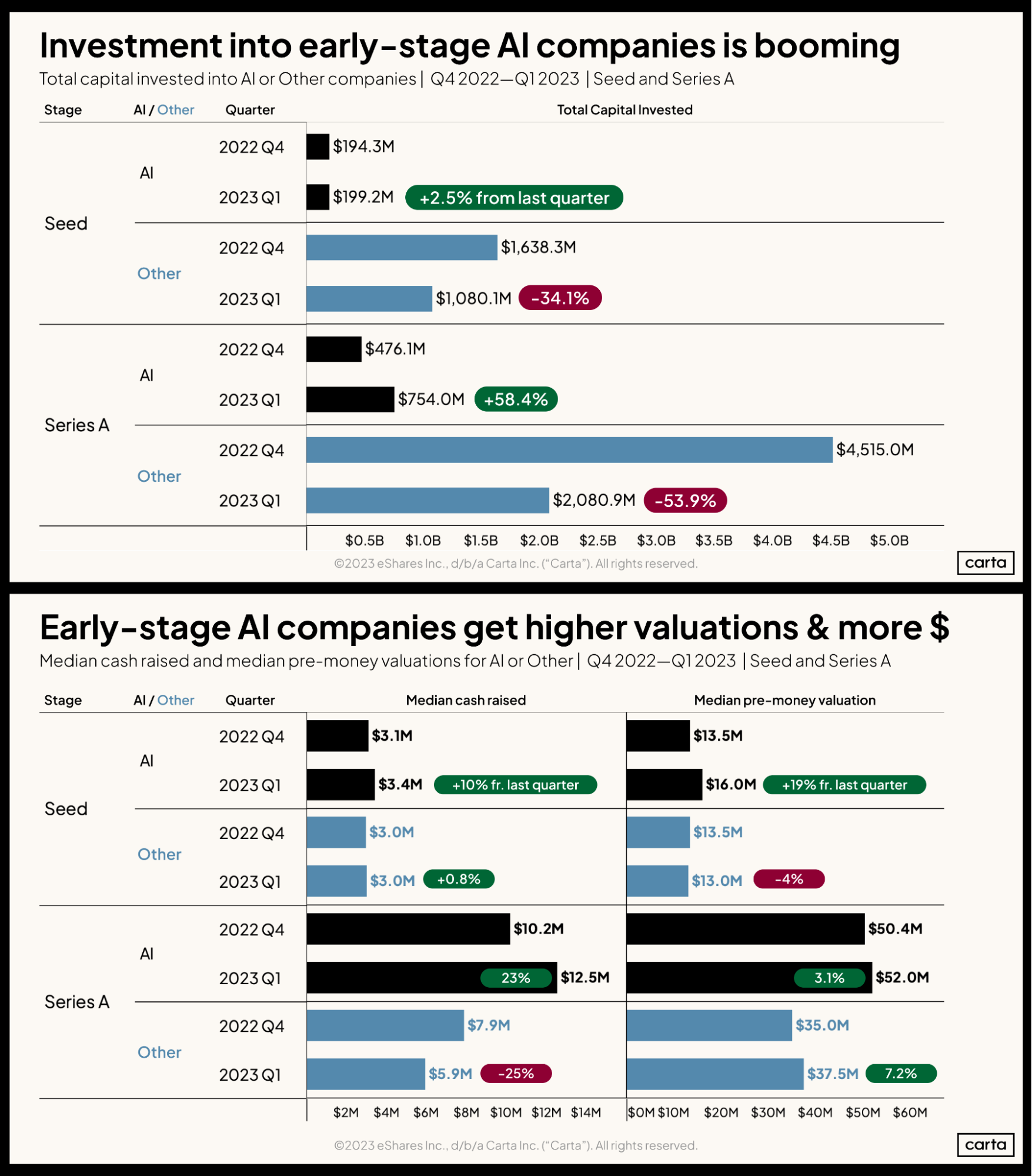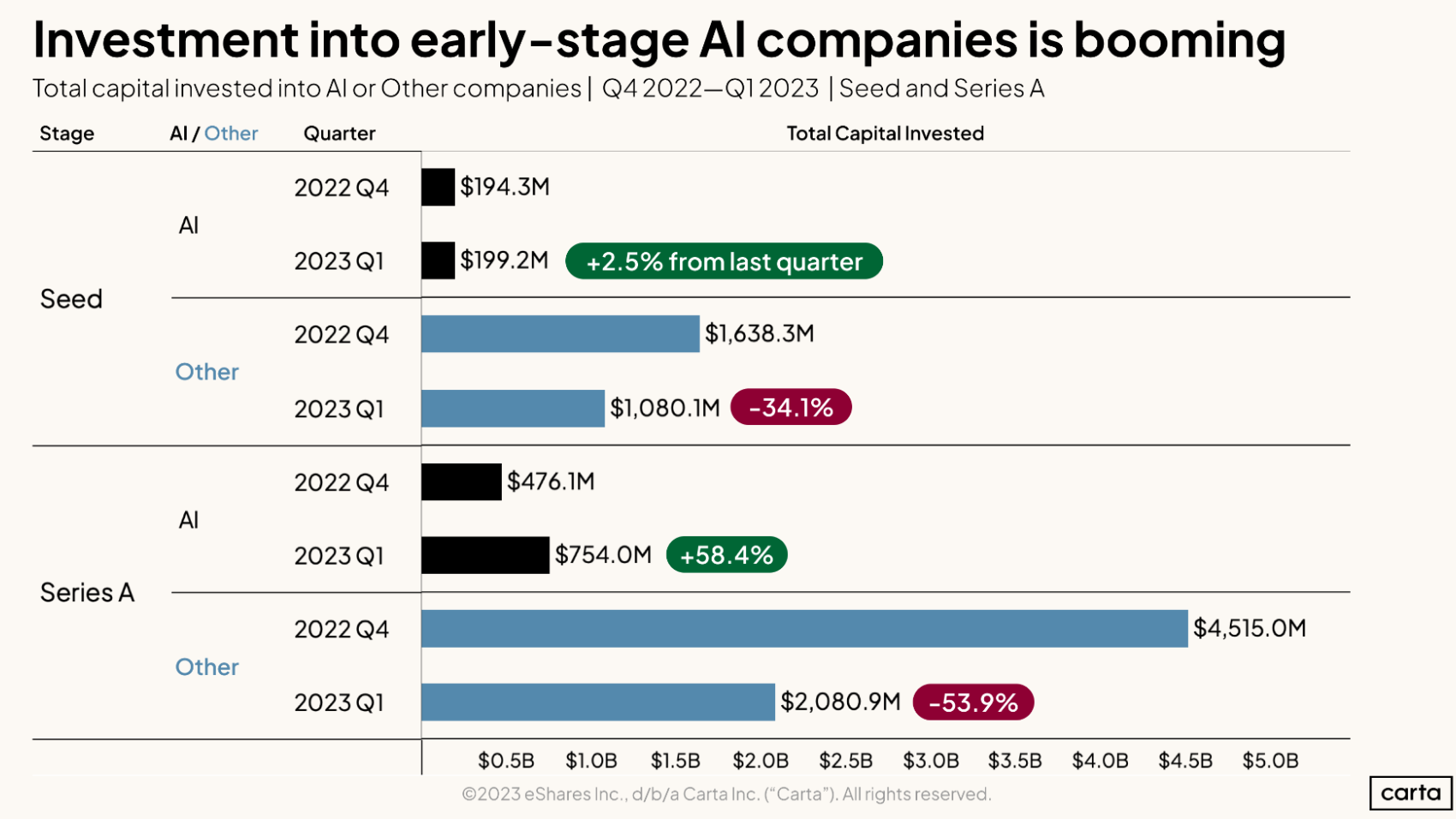On the final day of November, OpenAI released the first public version of ChatGPT. Almost immediately, the generative AI chatbot became a phenomenon. Within two months, ChatGPT claimed more than 100 million monthly active users, making it the fastest-growing consumer app in history (at least for a few months).
Venture capitalists were paying attention. In the months that followed, early-stage startups across the whole AI sector saw a significant increase in key venture metrics such as total capital raised, median round size, and median pre-money valuation. These upticks were all the more notable considering the broader venture industry was still very much in the midst of a downturn, with most major metrics moving in the opposite direction.
For instance, AI companies on Carta raised $754 million in Series A funding in Q1, a 58% increase over Q4 2022. Non-AI companies, meanwhile, raised just shy of $2.1 billion in Q1, a 54% quarter-over-quarter decrease. The result: AI’s share of all Series A funding shot up from 10% in Q4 2022 to 27% in Q1 2023.
“The amount of excitement and conversation and the wonder effect of some of this AI tooling is very potent,” says Jeff Laretto, a partner at the law firm Cooley who specializes in advising high-growth tech companies. “It’s probably more potent than anything I’ve seen in a long time, going back to maybe the Facebook platform in 2008.”

In the months since, ChatGPT has grown slightly less white-hot; its number of monthly users declined for the first time in June.
But investors, founders, and other key players in the startup ecosystem remain convinced of AI’s power, with much of the recent attention focused on generative AI—that is, AI tools that can create content like text or images. A wave of young startups have raced to raise funding and bring their own generative AI products to market, in some cases competing with high-powered offerings from tech giants like Google, Meta, and Microsoft. This rapid adoption of AI tools and rampant investor optimism around the industry’s future have been one of the defining stories of VC in 2023.
Big investments, big opportunities
Much of the excitement and wonder about the recent AI wave is related to the scope of the opportunity ahead.
“You can split the ecosystem broadly into two categories: the platform and the apps,” says Jon Turow, a partner at Madrona who makes venture investments in AI, machine learning, and other tech sub-sectors. “I would say that the platform opportunity is enormous albeit finite, and the app opportunity is nearly infinite. Even if one is mathematically larger than the other, both areas will support really big businesses.”
Turow defines a platform as a company that provides critical infrastructure for other AI companies. As a comparison, he points to how Amazon’s AWS and Microsoft’s Azure have built huge cloud computing businesses that underlie so many other major tech companies. By apps, he means consumer products built specifically to capitalize on AI. The same way Google’s early search engine couldn’t have existed without the internet and mobile apps rely on the innovation of the smartphone, Turow expects AI will give rise to new consumer tools that weren’t previously possible.
These blue-sky possibilities are certainly enticing. But in many ways, AI—and generative AI in particular—is still a nascent field. Some of the technologies powering the recent frenzy, such as a type of powerful neural network called a transformer model, have only existed for a few years. There is still much uncertainty about where AI will go next. As such, there is also still much uncertainty about which startups are best positioned for success.
The venture business model is based on the knowledge that most investments will fail. The idea is to find one or two big winners in each fund that will generate large enough returns to offset any smaller losses. When it comes to AI deals, this same approach applies. If anything, investors are expecting the bifurcation between winners and losers to be even greater, according to Cooley’s Laretto.
“What I’m hearing from investors is: You have to place a lot of bets. It’s impossible to pick which of these companies are going to do something state of the art and which of these companies are going to founder,” Laretto says. “[Investors are] expecting an almost binary outcome. Virtually all [companies] will fail, but a few of them will become generational companies.”
Inside an AI fundraising
AptEdge is a startup founded in 2019 that uses generative AI to help customer service teams provide faster and more accurate answers to customer questions. In June, the California-based company announced the close of an $11 million round of seed funding.
It was a hard-won victory for Aakrit Prasad, the CEO and co-founder of AptEdge. A veteran of the startup sphere who previously worked at Salesforce and AppDynamics, Prasad was struck by how things have shifted amid the broader VC downturn—and by how investors seem to see AI as an oasis amid an otherwise arid venture landscape.
“It was definitely a very difficult market to fundraise in,” Prasad says. “Unless you’re building things that are generative AI-powered, people don’t even want to meet.”
AptEdge has been using AI technology in various forms since its inception. But it was only after ChatGPT’s latest release in November that Prasad’s startup began to rely heavily on generative AI, using the chatbot to help write proposed replies to client queries, which customer service agents can then review and edit. Such a change was only possible, Prasad says, because of a significant leap in the quality of ChatGPT’s output.
“It was very surprising to see how much better it got,” Prasad says. “We knew it was going to happen. But I don’t think we expected it to happen that fast.”
Still, generative AI is only one part of AptEdge’s high-tech recipe. Prasad says the core of the company’s product remains its machine learning systems that can rapidly read and process huge libraries of internal documents to help customer service reps arrive at the right answer. But when it came to driving interest in its recent seed round, generative AI was key.
“For us, the generative AI piece is really the last mile of our product, enhancing the UX and the delivery experience,” Prasad says. “But investors wanted to see that.”
The AI effect
Prasad’s recent experience as a founder aligns with what Laretto has seen as a lawyer. If you were trying to raise capital in the first half of 2023, it was a lot easier as an AI startup.
“There are a number of AI companies fairly fresh out of the gate…that are able to raise money like it’s early 2021. They’re able to unlock capital at extremely high valuations and do so well earlier than most companies,” Laretto says. “If you take out that cohort of AI companies, all other companies seem to be struggling to raise.”
In June, a French startup called Mistral AI raised more than $100 million in a funding round that occurred just four weeks after the company was founded. Anthropic, Runway, and Inflection AI have all raised massive VC rounds of their own in recent weeks. OpenAI was valued at nearly $30 billion in an April tender offer.
“The speed of development is pretty alarming, right?” Laretto says. “Three people coding for three weeks have been able to build some amazing things very quickly.”
For the investors, founders, and executives trying to determine how this current AI craze will shape the future of business, that rapid rate of development means there’s little time to waste.
“Every CEO and every board of directors is asking, ‘What’s our generative AI strategy?’” says Madrona’s Turow. “I think everyone needs to figure out what AI means for them. Everyone.”
Get weekly insights in your inbox
The Data Minute is Carta’s weekly newsletter for data insights into trends in venture capital. Sign up here:

